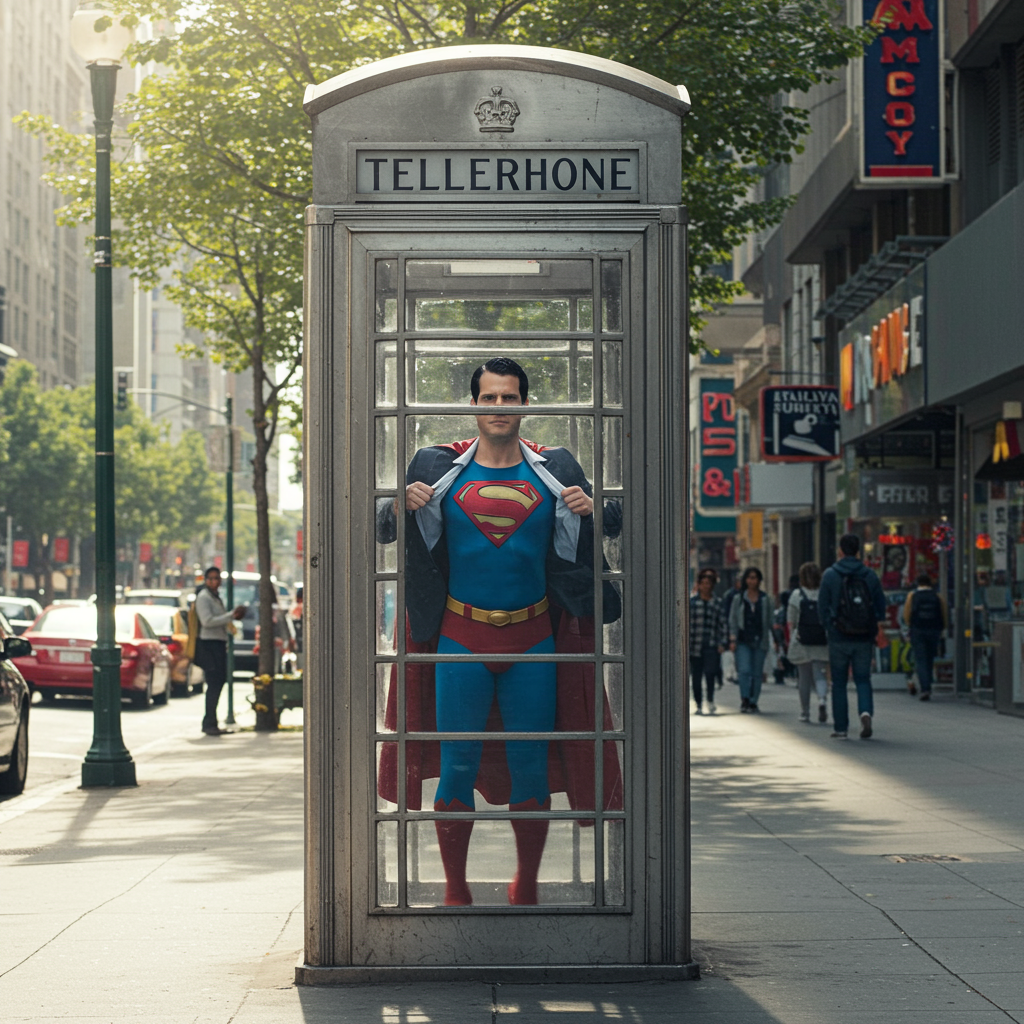In a classic scene from the 1978 “Superman: The Movie,” Clark Kent, seeking a private space to transform, is met with the comical reality that telephone booths, once his reliable changing room, have evolved into transparent, impractical structures. This sly visual joke, depicting a hero momentarily out of step with a changing world, inadvertently sparked a perennial debate: Is Superman truly the least relevant superhero in our modern age? Far from it. In an increasingly complex and cynical society, the Man of Steel’s unwavering moral compass and inherent goodness are not liabilities, but his ultimate, enduring strength. His timeless appeal offers a much-needed beacon of hope and a profound reflection on what it means to be truly heroic.
Why Superman’s “Irrelevance” is a Misconception
For decades, critics have questioned Superman’s place in a world that craves anti-heroes and moral ambiguity. Some argue his boundless powers make him less relatable, his resolute goodness seem naive, or his traditional values feel outdated. Unlike heroes burdened by trauma, like Batman’s dark past or Spider-Man’s personal guilt, Superman’s core struggle is often seen as less dramatic. He doesn’t brood; he soars. He doesn’t seek vengeance; he inspires. This perceived simplicity can lead some to believe he lacks the modern edge required for cultural relevance.
However, this perspective misses a critical point. The very consistency of Superman’s character, his “inimitable good,” is precisely what makes him invaluable today. In a contemporary landscape marked by tragedy, division, and declining hope, audiences are actively searching for characters who embody straightforward virtue. His struggle is less about his powers and more about his internal battle to balance personal desires with the overwhelming needs of the world. This profound internal conflict, though often overlooked, becomes deeply relatable when Superman strives to embody goodness within a corrupted environment.
The Resurgence of the Pure Hero
According to communications expert Steve Granelli, Superman is now more relevant than ever because the world around him has changed, not the character himself. There’s a growing cultural craving for a hero who is “just strictly good,” devoid of hidden agendas or dark backstories. He represents kindness as a default, not an extraordinary act. This classic alien beacon of hope, born in 1938 with laser eyes and an unwavering moral compass, offers a refreshing alternative to the grim and psychologically complex superhero narratives prevalent in recent years.
Consider the superhero landscape today: Zach Snyder’s previous cinematic iterations of Superman were often dark and brooding. Marvel heroes, while popular, are increasingly weighed down by the intricate, nearly two-decade-long continuity of the Marvel Cinematic Universe, demanding extensive viewer commitment. Even more cynical narratives like those in “Watchmen” and “The Boys” have gained traction by subverting traditional superhero ideals. Against this backdrop, Superman’s pure, uncomplicated force for good is a breath of fresh air. It offers an “easy story for us to latch onto,” something increasingly rare in modern cinema.
An Archetype of Sacrifice and Hope
Beyond his immediate relevance as a symbol of goodness, Superman also taps into deeper, timeless archetypes. Many superheroes, often unintentionally, parallel the narrative and character traits of profound savior figures, with Superman standing out. He is frequently described as “Sunday school theology in spandex,” a literal son sent from the sky, raised among humans, who ultimately reveals his power, dies, and returns.
His power is not merely physical might; it lies in his remarkable restraint and his consistent choice of mercy over domination. Unlike vigilantes driven by vengeance, Superman’s mission is to save, protect, and instill hope. This makes him a figure who conquers not through brute force, but through self-giving – echoing universal themes of sacrifice, redemption, and resurrection that resonate across cultures and belief systems. He exemplifies the idea that true strength lies in humility and the willingness to sacrifice for others, never seeking glory or initiating conflict.
James Gunn’s Vision: Embracing the Classic
The upcoming “Superman” film, helmed by James Gunn, aims to embrace these classic stylings, reaffirming his enduring appeal. The film’s anticipated runtime, approximately 2 hours and 20 minutes, is a deliberate nod to the original 1978 movie’s length. This choice underscores Gunn’s commitment to honoring established franchise elements and delivering a traditional Superman experience, unlike the sprawling, often three-to-four-hour epics common in contemporary superhero cinema.
Gunn has consistently stated that his take will be a return to the hero’s foundational characteristics. He recognizes that audiences today are “looking for heroes,” seeking “values of goodness,” and people who are “good and decent human beings.” This approach is poised to reintroduce a “pure force for good” narrative that, while classic, feels both refreshing and much-needed. By embracing the character’s original “colors and goofiness” rather than shedding them for mainstream appeal, Gunn’s vision ensures Superman remains relatable and inspiring, providing audiences with an unwavering moral compass in a world eager for guidance.
Superman’s Unique Place in the Modern Hero Landscape
While other superhero franchises, like the Marvel Cinematic Universe, are building increasingly complex and interconnected narratives, often tying up loose ends from previous projects and setting up future crossover events, Superman’s appeal lies in his relative self-contained purity. Projects such as “Captain America: Brave New World” are designed to serve as critical stepping stones, connecting multiple storylines and introducing new elements like the powerful metal adamantium from a Celestial’s hand. These sprawling narratives, while ambitious, can sometimes dilute individual character focus in favor of a larger cinematic universe.
Superman, by contrast, thrives on a more singular focus: his role as humanity’s moral anchor. His story doesn’t necessarily require extensive knowledge of an interwoven universe; his core values are universally understood. This simplicity, paradoxically, enhances his relevance. In an era of political polarization and complex discussions around immigration, his alien origin takes on unique socio-political dimensions. As an alien arriving in a “broken place,” he embodies the desire to improve things, even when encountering established structures and powers that actively impede efforts for good. He is a role model and a mirror, subtly suggesting that kindness and moral fortitude should be the default, not an act of heroism.
Frequently Asked Questions
What makes Superman especially relevant in today’s complex world?
Superman’s enduring relevance stems from his unchanging, unwavering goodness. In an era marked by cynicism, division, and pervasive uncertainty, his pure, incorruptible nature offers a much-needed beacon of hope and moral clarity. Unlike many contemporary heroes burdened by trauma or moral ambiguities, Superman embodies inherent virtue and chooses mercy and restraint over brute force, inspiring audiences to believe in the fundamental power of good in a troubled world.
How does James Gunn’s upcoming Superman film aim to redefine his classic image for new audiences?
James Gunn’s new “Superman” film intends to return to the hero’s classic roots, focusing on his “inimitable good” and embracing the character’s traditional “colors and goofiness.” The film’s runtime mirrors the original 1978 movie, signaling a deliberate choice to honor established elements rather than completely reinventing him. Gunn aims to highlight Superman as a “pure force for good,” aligning with a growing audience desire for heroes who embody values of decency and hope amidst complex contemporary issues.
Why is Superman often seen as a ‘Christ-like’ figure in popular culture?
Superman is frequently perceived as a “Christ-like” figure due to numerous narrative and character parallels. As an alien “son” sent from the sky, raised among humans, who reveals extraordinary powers, dies, and returns, his story echoes themes of divine intervention, sacrifice, and resurrection. His ultimate power lies in restraint, mercy, and a selfless dedication to saving humanity, focusing on hope and protection rather than vengeance, mirroring the self-giving nature of a savior archetype.
The Unwavering Strength of Hope
The narrative of Superman’s declining relevance is a compelling, yet ultimately flawed, one. While the phone booth joke in 1978 playfully hinted at a hero struggling to adapt, the truth is that Superman’s core identity—his unwavering goodness, immense power tempered by profound compassion, and relentless pursuit of justice—remains profoundly relevant. He reminds us that true strength lies not in darkness or complexity, but in the steadfast choice to do good, even when it’s difficult. As a symbol of enduring hope and integrity in turbulent times, Superman is not just a hero of the past; he is the unwavering beacon we need now more than ever. His greatest strength was never his flight or his laser vision, but his unwavering heart.


